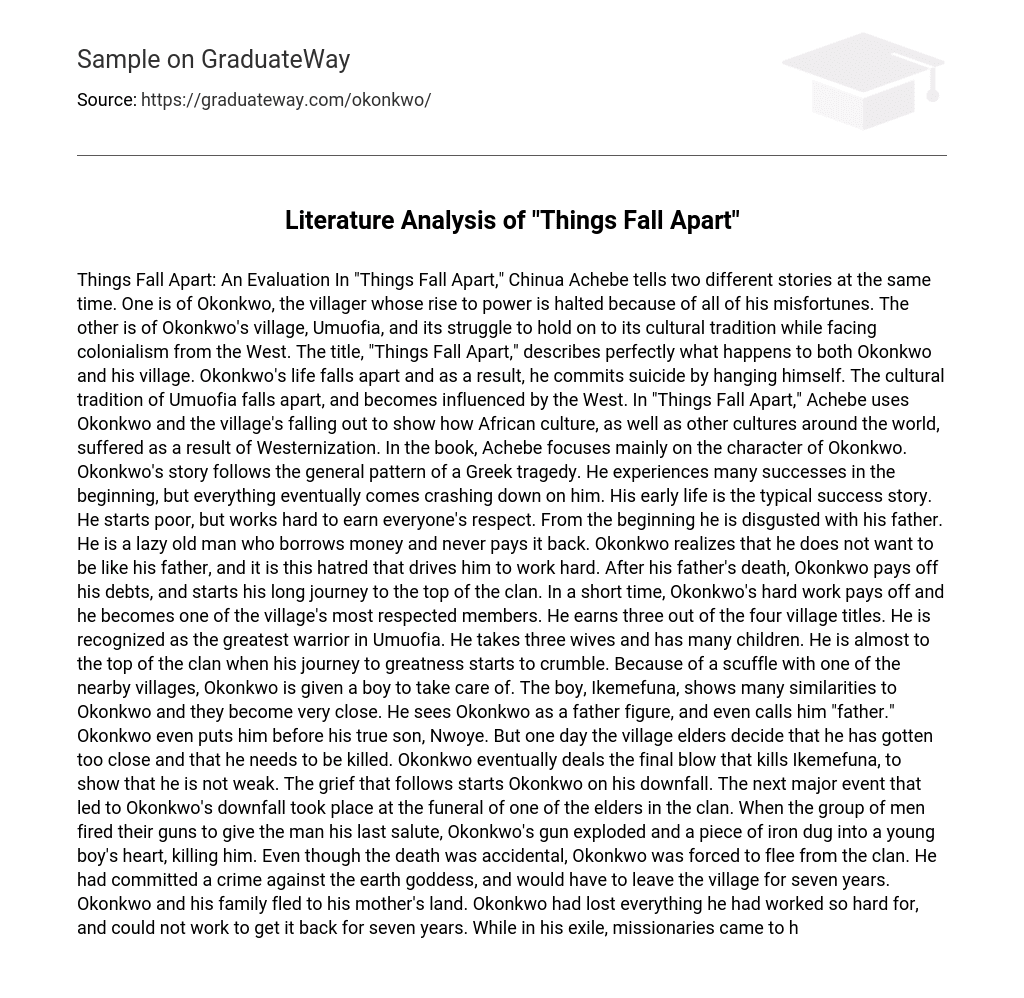Chinua Achebe’s “Things Fall Apart” tells two interconnected stories. One follows Okonkwo, a villager whose path to power is obstructed by a series of misfortunes. The other depicts Umuofia, Okonkwo’s village, as it struggles to preserve its cultural heritage in the face of colonialism from the Western world. The title, “Things Fall Apart,” effectively captures the downfall experienced by both Okonkwo and his village: Okonkwo’s life unravels, ultimately leading him to hang himself, while Umuofia’s cherished traditions crumble under Western influence.
Achebe uses the character of Okonkwo and the conflict within the village in “Things Fall Apart” to illustrate how Westernization had negative effects on African culture and other cultures worldwide. Throughout the book, Achebe primarily focuses on Okonkwo, whose life follows a pattern akin to a Greek tragedy. At first, Okonkwo achieves great successes, but ultimately faces a devastating downfall. His early life embodies a typical rags-to-riches tale, where he starts from a position of poverty but diligently earns the respect of others. Right from the start, he is repulsed by his father’s lazy ways, as the latter frequently borrows money without repaying it. Okonkwo’s determination to avoid being like his father drives him to work relentlessly. Following his father’s death, Okonkwo repays all the debts and embarks on his journey towards becoming the respected leader of the clan.
Okonkwo’s diligent efforts yield results and he rises to become one of the esteemed individuals in his village. He attains three out of the four village titles and gains recognition as Umuofia’s most eminent warrior. He enters into marriage with three wives and sires numerous offspring. As he nears the pinnacle of his clan, his path towards greatness begins to falter. Due to a skirmish with a neighboring village, Okonkwo is entrusted with the responsibility of caring for a young boy.
The text portrays the strong bond between Okonkwo and Ikemefuna, who sees Okonkwo as a father figure. Despite being closer to him than his own son, Nwoye, the village elders consider their connection too strong and order that Ikemefuna be killed. In an act of strength, Okonkwo delivers the fatal blow that ends Ikemefuna’s life. This tragic event marks the beginning of Okonkwo’s downfall.
During the funeral of a clan elder, another significant incident occurs. As men fire their guns in salute, Okonkwo’s gun explodes and sends out an iron fragment that fatally pierces a young boy’s heart. Although unintended, this offense against the earth goddess obligates Okonkwo to flee from the clan. Consequently, he must leave the village for seven years.
Okonkwo and his family were forced to flee to his mother’s land due to losing everything they had worked for. They couldn’t retrieve their belongings for seven years and found themselves in a state of despair. It was during this time that missionaries arrived, greatly disturbing Okonkwo.
The conversion of his oldest son, Nwoye, to the new faith further angered Okonkwo towards the missionaries. His resentment grew stronger upon returning to Umuofia after being exiled.
Furthermore, Okonkwo reached peak distress when the men of Umuofia decided against going to war with the white men. The situation became unbearable when five court messengers disrupted a village meeting. Driven by his pent-up anger, Okonkwo beheaded the head messenger as a drastic measure, ultimately leading to his own downfall.
Okonkwo’s life completely crumbled when his body was discovered hanging from a tree, causing the village of Umuofia to also collapse in a different manner. As the white missionaries arrived, the villagers didn’t perceive them as a significant danger and ultimately suffered the consequences.
Despite the inescapable decline of the village due to Western influence, only a few civilizations managed to resist its impact. The strength and complexity of this force overwhelmed ordinary people, rendering them unable to resist it. Achebe’s book illustrates how Westernization contributed to the downfall of numerous ancient cultures. From my perspective, what makes this book widely appealing is its relevance not just to Africa but also to other cultures worldwide that have experienced the consequences of Westernization.
In his book “Things Fall Apart,” Achebe explores the influence of Westernization on individuals, communities, and cultures worldwide. Bibliography:





